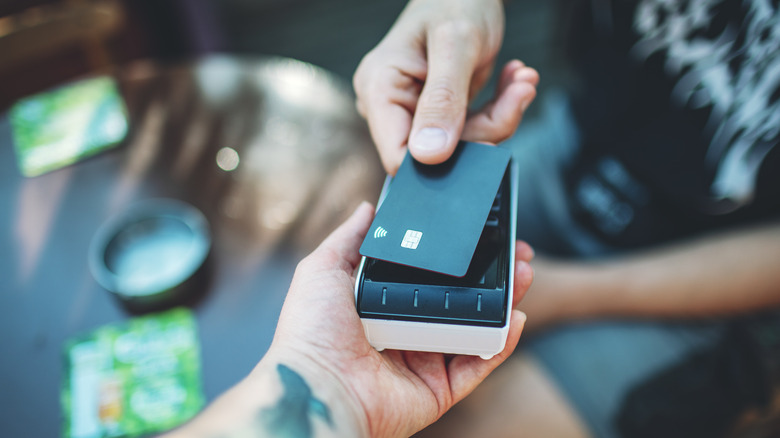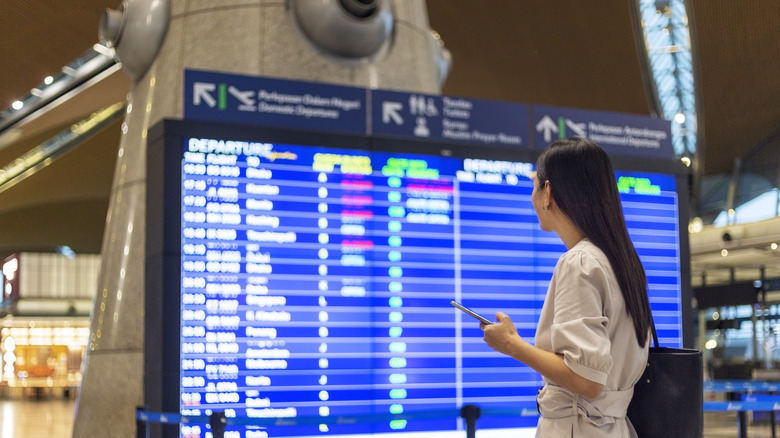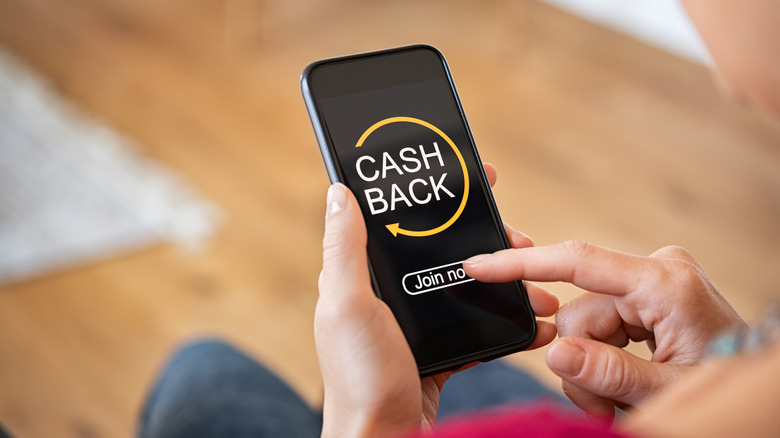14 Little-Known Credit Cards Perks You Should Be Taking Advantage Of
When many apply for a credit card, the deciding factors that influence our decision revolve around credit limits, monthly premiums, and special limited-time offers of lower premiums. If this is the extent of your research however, you may be leaving many of the perks of owning a credit card on the table — and you wouldn't be alone.
As per CreditCards.com, 23% of people with credit cards didn't take advantage of any points they earned over the year. When broken down among demographics, it appears millennials and Gen Z use the least amount of points they earn, with just 15% to 18% of them making use of them. Even Gen X and the baby boomers use them only 28% of the time. According to The U.S. Bureau of Labor Statistics, the average household expense in the U.S. in 2022 was $72,967, with food, entertainment, apparel and services, healthcare, education, personal care products, and services totaling nearly 38% of that. That's around $27,727 per year or $2,310 per month of chargeable expenses that could be building you major points and rewards. For example, Chase Sapphire Reserve is offering 60,000 bonus travel points on expenditures over $4,000 during your first three months as a cardholder, equivalent to $900 in travel credit. That's just one example of a perk not being taken advantage of fully. Here are a few more you've probably never considered.
Travel protection
While travel points are great, there are other travel perks your credit card company may provide that could protect the trip you paid for with those hard earned travel points. Consider travel insurance, which exists to ensure your money is refunded or your trip rescheduled should your travel plans go awry for anything you can't be faulted for.
Chase Sapphire Reserve offers protection for everything from trip cancellation to lost luggage. With $10,000 to $20,000 worth of coverage for cancellations or interruptions, $500 for trip delays extending over 12 hours, and up to $3,000 worth of coverage per passenger for lost luggage, it's obvious how this card can add more value than air travel points. Don't worry about costs if you or your co-passenger need medical attention while on vacation, either. Chase Sapphire covers between $500,000 to $1 million worth of travel accident insurance depending on whether you hold a Preferred or Reserve card.
While different travel cards offer varying benefits, and some are better than others, most come with a level of travel protection. A travel credit card with insurance is also a great way to get the benefits of travel insurance without going through an insurance company where you'll have to pay extra premiums to have it.
VIP access
Aside from insurance and travel points, your card may also get you past the velvet rope and give you automatic VIP access to an airport lounge or just special treatment. You can skirt the drama of trying to find a comfortable seat in a crowded airport, especially one near a charging port for your tech, by using your Platinum Amex card to slip into a spacious, plush Centurion or Escape airport lounge.
American Express now boasts over 40 lounges around the world, with three more lounges scheduled to open in Washington D.C., Atlanta, Georgia, and Newark New Jersey in 2024. While the passes won't give your guests the same perks if they don't have the card — unless you charge at least $75,000 in purchases within a year being a member allows paid access to kids under 17 and adults for $30 and $50 respectively. Using the lounge at JFK Airport in New York as an example of the amenities you can expect, the lounge has two upscale bars, a DIY spa, workspaces, a cafe bar, a family room, and even a shower. With a Citi / AAdvantage Executive World Elite Mastercard, you can get priority security screening for yourself and your travel buddies, as well as priority boarding access.
Rental car insurance
If you need a car to get you where you want to go once you step off the plane, or you just need a rental for a weekend getaway, there are credit card companies offering rental car insurance as part of your service. If you don't drive or own a car so collision or comprehensive car insurance isn't part of your insurance portfolio, your credit card may give you all the coverage you reasonably need.
As part of Chase's travel perks, the company offers an "auto rental collision damage waiver" that reimburses up to the cash value of the rental car in the case of physical damage or theft. It also covers the cost of towing the car if you end up on the side of the road and even protects your car rental company from loss-of-use charges while the car is in the repair shop. Your best bet for rental car insurance coverage is through Case credit cards since these offer the most rental car coverage out of any of the credit card companies with more than double the coverage period of most other credit cards.
Warranty extensions
Here's something you don't even know you need until you need it, and if you've ever broken something right after the warranty expires, you'll appreciate that you have it. Some credit card companies provide warranty extensions on things you purchase with your card. Bank of America's Premium Rewards card adds up to one full year of warranty coverage on top of whatever the manufacturer offers, maxing out at a total of three years. Meanwhile, Capital One will double the warranty period offered by the manufacturer of any product you purchase.
Aside from the additional retail protection, some of the best cards for warranty extension offer as much as $10,000 worth of coverage per item with a coverage maximum of up to $50,000 per year. Purchasing the extended warranty from the store is often a waste of money since it typically doesn't cost that much to repair an item and the manufacturer's warranty period is typically enough. A credit card with an extended warranty is better than paying for the store's extended warranty since you won't have to pay more upfront for the privilege.
Mobile phone protection
In the 21st Century, everyone needs a mobile phone, ergo, everyone should have a way to protect that phone from damage, theft, or loss. When you consider 77% of adults aged 18 to 29 years old and 74% of adults aged 30 to 44 will break their phones this year, you can understand why mobile phone insurance has become one of the easiest ways insurance companies trick you into spending more money. Going to an insurance company for mobile phone protection can add as much as $100 to your annual premium for a limited number of claims that, on average, will cost you a deductible of around $300.
The best credit card companies make mobile phone protection a free perk of being a cardholder, so there's no need to pay an insurance company a dime for this service. Several card companies including Chase, American Express, Capital One, U.S. Bank, and Mastercard have products offering as much as $1,000 worth of coverage two to three times per year with just a $25 to $100 deductible.
Cashback
Cashback is a lesser-known credit card perk that allows cardholders to get back some percentage of their purchases above a certain amount, either deposited directly into your account, as credit rewards that lower the cost of your monthly payment, or in the form of a check. Some businesses charge you extra for using a credit card to cover the processing fees credit card companies levy against merchants. This often comes back to the consumer as a 4% surcharge tacked onto your credit card purchase.
This is where a card that offers you cash back comes in handy. Let's take the Discover It Cashback card, due to its 0% interest rate and high cashback rewards. Until 2025, you would pay no interest on your credit card purchases and balances up to a maximum of $1,500, while earning a whopping 5% cashback. You could offset the 4% surcharge levied by merchants and still get 1% back. More than that, Discover will match your first year of accumulated cashback credit. This card would make more sense for pricier purchases like technology than say, a cup of coffee. Either way, it's helpful to recover money you would otherwise leave on the table in surcharges and also becomes an incentive to use your card on bigger purchases.
Grocery delivery and rewards
Everybody needs to eat, and groceries are something we all have to pay for. Why not build credit points or cash back on your groceries? As per Move.org, the median cost of groceries in the U.S. hit $415.53 per family member relative to eating habits and age. That's $4,986.36 per year or just under $5,000 annually. Finding a card that allows you to convert some of that expense into travel points or cashback makes good sense.
Take for example the Citi Custom Cash card. Citi offers a cashback of 5% on a maximum of $500 per billing cycle before lowering to 1% and starts you off with 20,000 free points if you charge a minimum of $1,500 in your first six months of becoming a cardholder. Calculating that against the average monthly grocery expense, if you spent just $250 per month, you would hit $1,500 in six months easily. You also get a $200 bonus just for signing up, with 0% APR for the first 15 months. Similar to the Citi card, the Instacart Mastercard offers $100 Instacart credit, a free year of Instacart subscription, and unlimited free grocery delivery on orders over $35. No annual fee and 5% cashback on groceries make this a great option to pay for your grocery deliveries.
Food delivery and takeout
Groceries aside, sometimes you just don't want to cook. When you're out of ideas or just unmotivated to make your own meals, delivery or takeout doesn't have to be a financial extravagance. According to USA Today, Americans are spending $407 a month on deliveries in 2023, with online food delivery making up $160 billion of that. It turns out that an average $654 per year is lost to consumers in delivery fees after spending an average of $1,850 on delivery. What if the same card you used to charge all those deliveries helped you recoup some of those delivery fees through cashback?
Food delivery apps have gotten into the credit card industry with cards like the aforementioned Instacart Mastercard and DoorDash Rewards Mastercard. The DoorDash card should be the go-to card for Uber or DoorDash deliveries, handing you 4% cashback on DoorDash orders, 10% on Uber Eats purchases, 3% on takeout orders direct from the restaurant with no annual fee, and a DashPass worth $96 that renews once you spend $10,000.
Entertainment
Are you not entertained? Getting yourself a new credit card like the Blue Cash Preferred card from American Express could help with that. If your goal is a happy night with a plethora of streaming services, the 6% cashback on all your subscriptions might save you enough money to pay for yet another subscription. If you spend $9.99 or more on the Disney Bundle, which includes Disney, Hulu, and ESPN+, you can recoup $84 a year on top of the 6% cashback perk.
More interested in a night out? Whether you drive yourself to your destination or ride with a designated driver, an opportunity to pay for gas and earn 3% cash back on the purchase should make you think twice about using your debit card to pay for gas. Your designated driver will love you for it, and your credit card will, too. If you rent a vehicle for a weekend jaunt, you can take some assurance from the rental car insurance protecting your vehicle and saving you from spending more on the rental car company's insurance. Better still, the 3% cash-back benefit is transferable to taxis, public transit, parking, and tolls.
Dining out
According to CNBC, we spend $3,675 eating out annually, translating to about $306 per month. In a study of the best credit cards for dining out, they found Chase Sapphire and American Express offered the greatest benefits to cardholders. Although the card has a $95 annual fee, if you eat out even once a week, you'll be getting your money's worth in the form of three times the travel points earned from dining out and 60,000 bonus points if you spend $4,000 on purchases in the first three months, including meals.
Not to be outdone, the American Express Gold Card gives cardholders a $120 dining bonus per year by crediting $10 per month of Grubhub, The Cheesecake Factory, Goldbelly, Wine.com, Milk Bar, and Shake Shack orders. You will also earn four times the travel points whether dining in, taking out, or paying for delivery. American Express also offers 60,000 bonus points but gives you the first six months to spend $6,000 to get them.
Online purchases
Although shopping in stores for many purchases is still more the norm than online shopping, according to Pew Research Center, that's changing quickly. Online sales averaged close to 15% of all retail purchases to the tune of over $793.7 billion in the last three quarters of 2023. With 81% of shoppers preferring to pay for purchases with cards over cash, and 183.9 million Americans in possession of credit cards, you can bet that most online purchases are with credit cards.
Credit cards offer cash back rewards for shopping, travel points, and in some cases, gift cards just for getting approved. One of the best cards for online shopping is the Prime Visa, which sets you up for online shopping success with a $100 Amazon gift card upon approval. You can earn 10% cash back on those Amazon purchases and 5% cash back on Chase Travel products, Whole Foods purchases, and Amazon Prime subscriptions and purchases. Finally, you can redeem your Amazon rewards in 24 hours.
Fraud protection
There were 805,000 reports of credit card fraud between January and September 2023, with 440,666 of those related to Identity theft. While horrible, there are credit cards that are better equipped to protect you from fraud moreson than others.
According to the National Council on Identity Theft Protection, three of the best cards are Privacy.com, Wells Fargo Cash Wise, and Capital One Visa. Privacy.com operates like a virtual credit card with customized spending limits and expiration dates that can be tailored to work with specific vendors. In other words, even if a fraud artist was able to get access to your information, it would be very difficult for them to use it just anywhere for any amount. Encryption technology and a platform that masks your detailed credit card info behind the virtual card help seal the deal.
Capital One Visa immediately alerts cardholders of suspicious activity with their accounts through direct texts and an instant alert system that sends you notifications whenever you charge something with your card. The best feature allows you to lock and unlock your credit card. So if you lose your card and lock it, you can avoid the hassle of waiting for a new card. Wells Fargo Cash Wise also offers monitoring, spending notifications, and a zero-liability policy to protect you from fraudulent charges on your credit card.
Rideshare benefits
According to Pew Research Center, 64% of research participants reported they had never used a ridesharing service. Ridesharing has changed the way we get around cities, and much of that movement is fueled by credit card charges. That being the case, it's just smart to use a card that rewards you for your rides. Since the two major ridesharing apps are Uber and Lyft, let's start there.
Chase Sapphire Reserve will give you 10 travel points for every dollar you spend on Lyft rides and two years of Pink membership for free. At a rate of $9.99 per month, the free membership sets you up to save $239.76 right from the get-go. Meanwhile, the Platinum Card from American Express offers $200 in Uber credit per year, as well as Uber VIP status if you live in a participating city.
Building credit
Last but not least, one of the most important perks of credit cards is they are great for helping to build credit fast. Sign up with a credit monitoring service to keep track of your credit inquiries, request a credit report from Equifax, Experian, or TransUnion once a year to see your credit rating, be sure to quickly address inaccuracies in your report, keep your card payments up to date, and if you're in good standing, ask to raise your credit limit every six months.
A great starter card for people without credit or needing to build some is the Mission Lane Visa Credit Card. With no annual fees and no security deposit, cardholders can automatically get reviews of their credit to show them their credit-building progress. You don't even need to endanger your current credit status with an unnecessary inquiry since you need to pass an online prequalification process before becoming eligible for approval.














